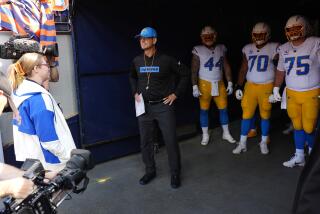Coach Says He Was ‘Sensitive’ to Swimmers’ Disorders
- Share via
Richard Quick, coach of the 1988 U.S. Olympic team and currently the coach of the Stanford women’s swimming team, responded Wednesday to a published report suggesting that the pressure he put on his athletes at the University of Texas contributed to their eating disorders.
“I was aware of a few eating disorders on our team at the University of Texas,” said Quick, who was at the national long course meet at USC. “We did everything in our power to get them the kind of help they needed to handle the problem. . . . Eating disorders run in varying degrees of magnitude. It’s a very secretive thing and it’s hard to get a handle on. But we were sensitive to the potential of those problems.”
The Austin American-Statesman quoted a survey showing that one of every 10 female athletes at the university suffered from an eating disorder such as anorexia (self-starvation) or bulimia (binge-eating and vomiting) and that 20%-30% showed some symptoms of eating disorders. The survey was compiled, during the 1987-88 school year, by Randa Ryan, a University of Texas exercise physiologist.
Those problems existed in all sports, but were much more prevalent among the swimmers, the survey showed.
Olympic gold medalist Tiffany Cohen, who swam for Quick at Texas, told the newspaper: “It bothered me because I’m a perfectionist. Richard knew that, and he knew who (weight) really affected. He played on that. He played on people’s neuroses.”
Quick said that the athletes who went to the psychologists who were made available at Texas were promised confidentiality, so the coaches were not told of the problems unless the athletes chose to tell the coaches.
“I think you know that eating disorders are common among elite athletes . . . particularly among elite female athletes and particularly at the college level,” Quick said. “It also exists among sorority girls who want to look good in the group picture.”
Quick said that at Stanford, he asks a nutritionist to talk with his athletes and he makes available a nutritionist and a psychologist.
“To my knowledge, we haven’t had problems at Stanford,” Quick said. “But I am not naive enough to think that I can say there’s not one.”
More to Read
Go beyond the scoreboard
Get the latest on L.A.'s teams in the daily Sports Report newsletter.
You may occasionally receive promotional content from the Los Angeles Times.







